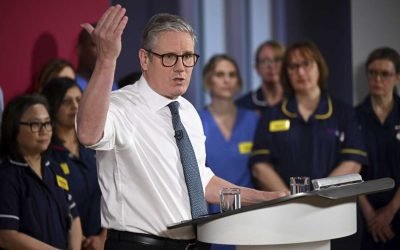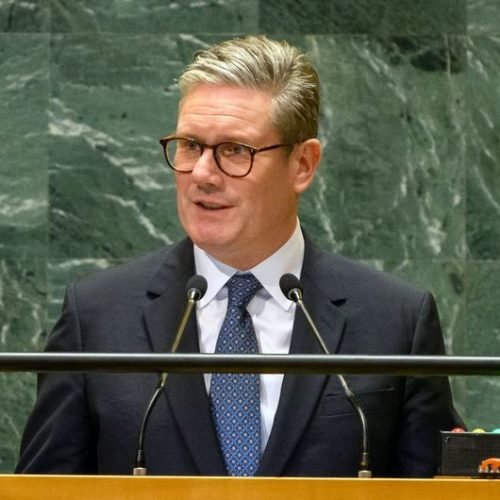
Biography
Keir Starmer (born September 2, 1962, London, England) is a British politician and barrister (lawyer) who became leader of the Labour Party in 2020. He has served as a member of Parliament for Holborn and St. Pancras since 2015. Starmer became prime minister of the United Kingdom, replacing Rishi Sunak, after a landslide Labour victory in the July 4, 2024, British general election.
Starmer is one of four children of Rodney Starmer, who worked as a toolmaker in a factory, and Josephine (née Baker) Starmer, a nurse. He was named Keir after the first parliamentary leader of the Labour Party, J. Keir Hardie. Starmer grew up in Surrey and attended Reigate Grammar School, a selective state school that became private during his time as a student there. The first member of his family to attain a university degree, he graduated from the University of Leeds with a bachelor of law degree in 1985. He next earned a postgraduate bachelor of civil law degree at St. Edmund Hall, Oxford. Between 1986 and 1987 Starmer belonged to the editorial collective of the left-wing magazine Socialist Alternatives.
Community-Based NHS
Prime Minister Sir Keir Starmer has unveiled a bold new vision for the NHS through a 10-Year Health Plan focused on bringing healthcare closer to people’s homes. The plan aims to shift care from hospitals to neighbourhood health centres, making services more accessible, personalised, and preventative. It includes training thousands of new GPs, investing in digital tools, and reducing waiting times. This long-term vision marks a transformative step toward a modern, community-centered health system.
A Law-Grounded, Rights-Based Governance
Starmer’s early career as a barrister and his role as Director of Public Prosecutions show a deep commitment to justice, fairness, and human rights. His experience has shaped a vision for a government that upholds the rule of law and defends civil liberties.
A Reformed, Centrist Labour Party
Since becoming Labour leader in 2020, Starmer has moved the party towards the political centre, distancing it from the more left-leaning stance of his predecessor. His focus is on pragmatism, unity, and electability, seeking broad appeal without compromising core Labour values.
Restoring Trust in Public Institutions
Having worked within the justice system and navigated political transitions, Starmer aims to rebuild public confidence in government, the legal system, and democratic institutions by promoting accountability and integrity.
Policy Overhaul and Progressive Reforms
Under his premiership, key reforms include:
Ending the Rwanda asylum plan, replacing it with a Border Security Command.
Launching a National Violent Disorder Programme to address domestic unrest.
Reforming workers’ rights, including raising the minimum wage.
Addressing prison overcrowding through early-release schemes.
Settling public-sector strikes, signaling a focus on negotiation and labor harmony.

NHS Neighbourhood Health Centres: A Key Initiative of the 10-Year Plan
A major initiative to establish Neighbourhood Health Centres across the country. These centres will deliver services like diagnostics, post-operative care, mental health support, and rehabilitation—all under one roof and closer to people’s homes.

International Students
the Prime Minister’s Initiative (PMI) aimed to increase the number of international students in the UK. It successfully met its targets ahead of schedule, helping the UK regain a 40% share of the global English language education market.

Fight for change
Sir Keir Starmer kicked off the new year with a promise to “fight for change” in 2025.
"The NHS should be there for everyone, whenever they need it." "But we inherited a health system in crisis, addicted to a sticking plaster approach, and unable to face up to the challenges we face now, let alone in the future." "That ends now. Because it’s reform or die. Our 10 Year Health Plan will fundamentally rewire and future-proof our NHS so that it puts care on people’s doorsteps, harnesses game-changing tech and prevents illness in the first place." "That means giving everyone access to GPs, nurses and wider support all under one roof in their neighbourhood - rebalancing our health system so that it fits around patients’ lives, not the other way round." "This is not an overnight fix, but our Plan for Change is already turning the tide on years of decline with over 4 million extra appointments, 1,900 more GPs and waiting lists at their lowest level for 2 years." "But there’s more to come. This government is giving patients easier, quicker and more convenient care, wherever they live."

Politician of the Year
Named by The Spectator at its annual Parliamentarian Awards ceremony

QC of the Year in Human Rights & Public Law
Bestowed by the Chambers & Partners directory, recognizing his outstanding legal advocacy.

Human Rights Lawyer of the Year
Awarded by Justice and Liberty for his pro bono work on death‑row cases in the Caribbean and contributions to Human Rights Act training.





